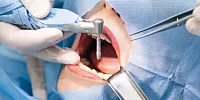-
Collective legal action taken against French low-cost dentist chain
More than 1,500 patients claim to have been left mutilated or without teeth after botched interventions
-
Comment: ‘If you are going to break a tooth, don’t do it in France in August’
Reader tells how he tried 70 different dentists - but still no luck
-
Patient reimbursement to end at French dental centres amid fraud claim
Irregularities noted at 10 sites include false invoices for crowns, invoices submitted twice and procedures carried out despite being deemed unnecessary
Tooth filling had to be redone - should I pay?
I recently had work done on my teeth which included a filling. However, a few weeks later the filling broke while I was eating. The dentist replaced it but insisted on charging me again. Is there no guarantee for dental work? B.W.

Unfortunately it appears there is no guarantee. Dentists are said to have an obligation of ‘means’ but not of ‘results’; that means they are required to carry out procedures in an appropriate way but they do not guarantee the work’s ‘effectiveness’.
A spokeswoman for the CNSD national unions group for dentists said dentists should consider “with tact and moderation” whether or not the need to redo any dental work is their responsibility.
“It is possible that a procedure has to be redone because the person’s dental health condition has changed in some way, without there being anything wrong with the way the procedure was carried out.
“For example, if the dentist did a filling and then a month later part of the tooth enamel fractured making the reconstruction less solid. If the dentist has to redo work without being to blame, it is perfectly acceptable for him or her to bill for it.”
She added, however, that if you think that the dentist was at least partly to blame then you could have to prove that he or she was at fault (due to clumsy work, negligence, a wrong diagnosis etc), by obtaining an expert opinion. This would be at your own cost and your health caisse should have information on suitable local experts.
A spokeswoman for the national dentists’ professional body ONCD said it is hard to judge without studying the individual case, including for example details of any plan de traitement (document which may be provided by the dentist explaining your dental problem and the proposed work to resolve it) and knowing what the patient was told before the work was done.
However, if you consider you have been the victim of poor practice she said you could address your complaint to the conseil départemental de l’ordre des chirurgiens-dentistes for your department, who may undertake a conciliation process.
























